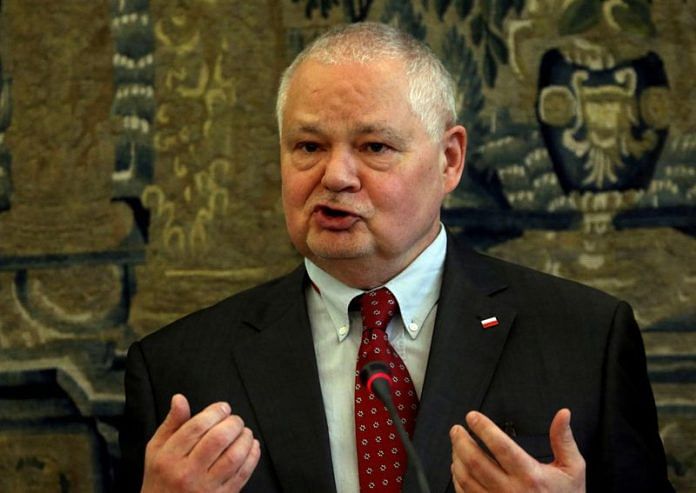By Karol Badohal
WARSAW (Reuters) -Poland’s central bank governor dismissed the charges against him in a motion which seeks to bring him before a State Tribunal as “baseless” on Friday, as he laid out a cautious path ahead for interest rates.
The motion submitted to parliament’s speaker last month set in train an unprecedented process that could result in Governor Adam Glapinski being removed from his post.
The charges facing Glapinski include lacking independence from the previous government, breaking constitutional rules that prevent the central bank from financing government borrowing when it undertook a quantitative easing programme during the COVID-19 pandemic, and misleading the finance ministry about the bank’s financial results.
Glapinski hit back on Friday in his monthly press conference, held after the National Bank of Poland (NBP) left its main interest rate on hold at 5.75% for the sixth month in a row.
“They are completely baseless, easy to refute, and seem to have been written hastily,” Glapinski said of the charges.
He said if the NBP had not used quantitative easing during the pandemic Poland’s subsequent economic growth would have been weaker and he dismissed the idea that he had deliberately misled the finance ministry.
DATA-DRIVEN APPROACH
Inflation in Poland fell below the mid-point of the NBP’s target range of 2.5% plus or minus one percentage point in March, but is expected to rise in the second half of the year due to temporary measures keeping food and energy prices down expiring.
Poland’s pro-EU ruling coalition restored the VAT rate on basic foods to 5% from zero as of April 1 but has yet to announce its plans for household energy prices, which are frozen until the end of June.
This uncertainty has led the NBP to adopt a cautious approach. Glapinski declined to say when he thought the cost of credit could fall.
“I don’t want to say when an interest rate cut will be possible,” he said, adding that the central bank would not be pressured into “hasty” decisions.
He said there was no reason to discuss raising rates.
According to Glapinski, if energy prices were completely unfrozen, inflation could rise as high as 7.5% from March’s 1.9%.
He said the main risk factor for inflation was rapidly increasing wages and that he expected inflation would fall back to the target range again in 2026.
(Reporting by Karol Badohal, Pawel Florkiewicz, Alan Charlish; writing by Anna Wlodarczak-Semczuk and Alan Charlish; Editing by Hugh Lawson)
Disclaimer: This report is auto generated from the Reuters news service. ThePrint holds no responsibilty for its content.



